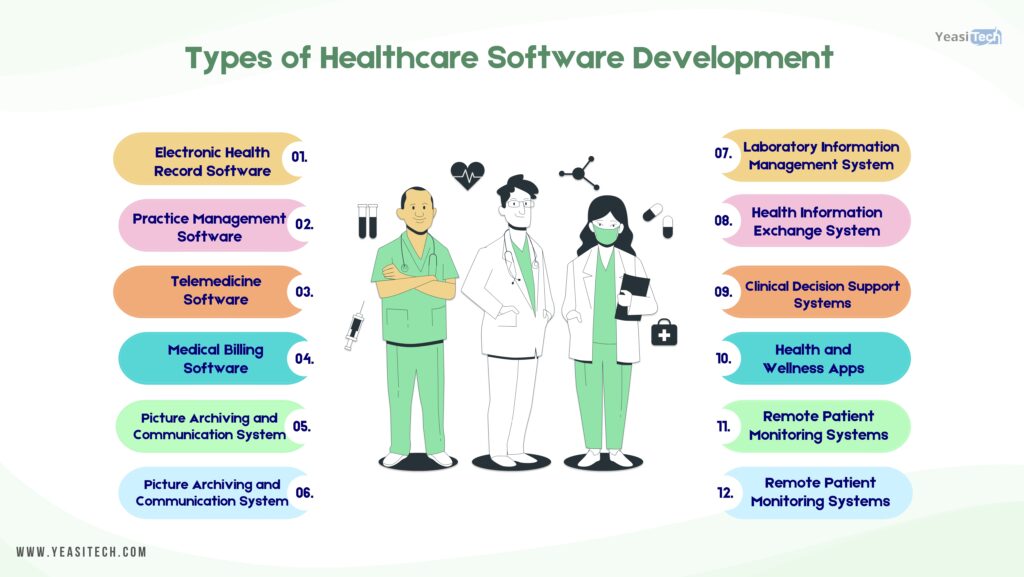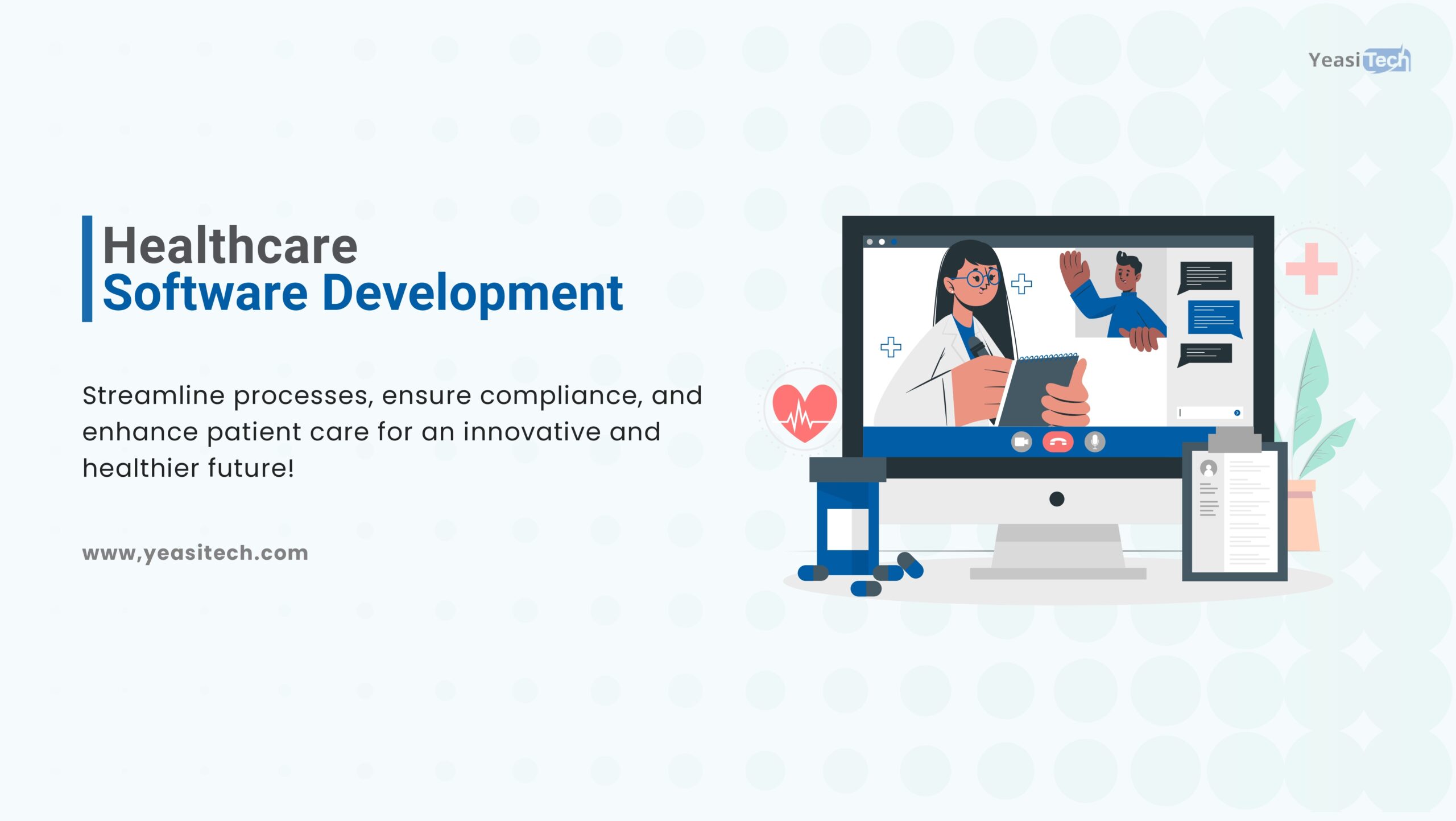The latest developments at the forefront of digital innovations have been observed in the healthcare sector in recent years. To provide scalable, secure, and profitable results, healthcare firms are now becoming more and more open to introducing new services and solutions.
In today’s world, healthcare software development is becoming progressively more common in the healthcare delivery sector. The quality of software engineering in healthcare has led to improved outcomes for patients, faster care delivery, and overall care service simplification as more institutions and businesses invest in and use software development for healthcare services.
Let’s review the various types of software development in the healthcare sector. Now let’s discuss them in detail:
Table of Contents
Different types of Healthcare Software Development

Electronic Health Record Software
To improve patient care experiences, healthcare providers are looking for demanding yet successful healthcare software development. These days, EHRs and other healthcare technology are essential to simplifying and improving the process.
Medical records, treatment histories, and other patient data are tracked with the use of EHRs, which are customized healthcare systems. Various healthcare processes and features, including personnel, billing, and information compilation, can be managed and worked on with the software’s help.
E-Prescribing Software
Prescription management software is growing more and more in demand as electronic medical records (EMRs) expand. Because software engineering plays such an important part in the healthcare sector, these custom healthcare systems will help in providing lab test results, patient data, medical records, and other health-related information. In addition, every document can be digitally signed by doctors and patients using e-signatures due to e-prescribing software.
Doctor’s prescriptions can now be emailed straight to pharmacies and drug stores via modern technology. It improves patient comfort and builds amicable relationships within the healthcare sector.
Hospital Software Development
Systems that handle clinical and administrative duties in the healthcare sector are developed more easily because of the software development technique used by hospitals. Patient safety regulations have been improved, errors are reduced, productivity is increased, and data quality gets better with hospital management software. Also, it simplifies the healthcare service workflow.
Hospitals can focus more on treating patients by using hospital software development rather than handling administrative responsibilities and physically updating documentation and records. Software with features like lab management, registrations, reporting, and billing can be developed as an integrated hospital system or as a stand-alone framework.
Software for Customer Relationship Management in the Healthcare Sector
Software packages that improve workflows and business processes, boost efficiency, and improve patient experience have been actively developed following trends in healthcare technology. Through the use of healthcare CRM, doctors can learn more about patient care and how to make changes.
Healthcare software development can be developed as an integrated hospital system or as a stand-alone system with features including billing, registration, reporting, and lab administration.
Healthcare CRM
Software packages that manage workflows and business processes, boost productivity, and increase the patient experience are being continually developed given trends in healthcare technology. Staff coordination, appointment scheduling, and patient follow-up are all made easier and improved by this.
Telemedicine Software
Using video or voice, telemedicine can easily and safely link patients and doctors anywhere in the world. Extra features like making notes and screen sharing are available on demand during online sessions.
Laboratory Information Management Systems
A lab integration feature allows you to effortlessly evaluate test findings, discuss test results with patients, submit patient lab orders directly to their history, and report lab results to public health organizations.
Radiology Information Systems
The tracking of patients and images, appointment scheduling, results reporting, and billing are all made possible by this diagnostic software. In radiology departments, a RIS system accelerates and promotes patient care and diagnosis.
Billing Management Software
E/M and co-payment calculators, insurance card scanning, eligibility verification, generating bills, monitoring payment status, submitting claims to insurance companies, receiving alerts, etc. are all possible with the medical billing module.
EHR voice recognition
Minimize time spent on clerical work with EHR voice recognition, features like voice commands for system navigation, voice input, an automatic extension of medical terminology and abbreviations, and much more.
Various types of services are provided by companies that produce software for healthcare
Data for handling emergency analytics, client behavior, and financial KPIs can be collected here through technology. Spending money on a healthcare software business makes business when you take these factors into consideration.
Below are the types of services that healthcare software development companies offer. Let us discuss them in detail:
Healthcare Apps
- Patient input.
- Telemonitoring and telemedicine.
- Chatbots and virtual assistants.
- AI-powered personalized care.
Professional Solutions
- Patient-focused methods.
- Machine learning and artificial intelligence applications.
- Digital advances.
- Data interchanges.
Software for Healthcare
- Security and reliability.
- Operations and resource management in healthcare.
- Improving the diagnostic method.
- Radiology and imaging with AI.
Steps Involved in Healthcare Software Development
To ensure a smooth development process and the best possible outcomes, follow these steps:
Generating and Evaluating Requirements
Always conduct a study before starting a custom software development project, taking into consideration your organization’s needs, finances, and requirements. Get a second opinion by discussing it with your team, noting the specific requirements, and consulting knowledgeable software designers and doctors.
Design and Development
To proceed with software development, this phase comes after the analysis that has been created as a software framework. An overview of the program’s features and specifications, including database management, user interfaces, system interfaces, networks, and network requirements, is first established by software engineers.
The development stage comes right after the design stage. During this phase, all software components are put into effect, and the coding process is initiated. Using agile techniques and user-friendly interfaces is important all through this phase of development to increase user satisfaction, flexibility, and feedback incorporation.
Quality Assurance and Testing
Once the coding phase is complete, the testing phase starts. The modules are made available here for testing. Ignoring the fact that testing may not seem important. Avoiding the testing process will ultimately result in the software’s downfall. Software should be thoroughly tested before release, and any weaknesses identified should be fixed by the developers. Software has to pass a variety of tests after it is encoded, including functional, usability, and security testing.
Deployment and Training
When the software goes through sufficient testing, it is released into the market or organizational framework. When the software goes through sufficient testing, it is released into the market or organizational framework.
Healthcare Software Development’s Future Trends
Software development for healthcare businesses, particularly hospital management software, is projected to go through important turmoil, according to Deloitte. Customer-driven care, simple data communication, and open yet secure platforms will be the main priorities. The following are significant developments in medical software development:
- Integrating artificial intelligence (AI) to deliver precise diagnosis and more customized treatment plans.
- Certain groups, like the neurodivergent community, have requirements that are satisfied through a strong emphasis on online communication and self-care with a focus on accessibility and simplicity.
- The expansion of the Electronic Medical Record (EMR) software, which combines many specialties and electronically includes all patient records.
- Adopting blockchain innovation simplifies the sector while promoting transparency, trustworthiness, and engagement.
- Old barriers are being removed, and close-distance relationships between doctors and their patients are being encouraged by technological advancements in telemedicine.
- Research into how virtual reality (VR) and augmented reality (AR) could be used in patient education and medical professional training.
- The elderly population can benefit greatly from the development of technologies for managing chronic illnesses, such as smartphone apps and smartwatches.
The healthcare sector, with its software development, has a bright future. However, as modern digital systems frequently experience safety difficulties, they need to be solved. Big data management needs to be prioritized.
Wrapping Up
Employees, patients, and administrators all benefit from healthcare software development. With the correct software development company by your side, your journey will be successful, even though it might seem quite different and difficult. You’re ready to make a real difference in people’s lives now that you have a thorough awareness of the positive and negative aspects related to developing medical software.
If you and your organization are prepared to accept modern technology and transform your perspective, get in touch with Yeasitech web development experts to figure out more about the newest healthcare software development and how it might benefit your project or business.
How much does it normally cost to develop a healthcare app?
The amount and complexity of features in the desired solution, the size of the user base, the number of interactions it should have, and other aspects all influence how much custom healthcare software development services are going to cost.
What amount of time does it take to develop healthcare software?
Depending on the quantity and variety of features, the tools used to build them, and the platforms they must run on, the development duration for healthcare applications varies greatly. Get in touch with us to find out how long it would take to design the app of your desires.
How important is user experience (UX) for software used in the healthcare industry?
To guarantee that healthcare professionals can simply browse and use the system, user experience plays an important role in healthcare software.
How can data analytics and reporting be made easier by healthcare software?
Healthcare apps have to have complete analytics and reporting features to help healthcare providers make decisions based on information about patients. Making decisions, setting higher standards for quality, and maintaining a tab on the healthcare industry as a whole might all benefit from this.
How does software for healthcare development use artificial intelligence (AI)?
Medical image analysis, predictive analytics, and personalized treatment are only some of the tasks that AI may perform in healthcare software. Developers are responsible for maintaining data privacy, algorithmic decision-making flexibility, and ethical AI guidelines.
What challenges come up when developing software for the medical sector?
Maintaining data security, ensuring that complex healthcare laws are followed, solving compatibility issues, and keeping up-to-date with rapidly changing technology are among the challenges. It might be difficult to connect new users to existing healthcare systems.
